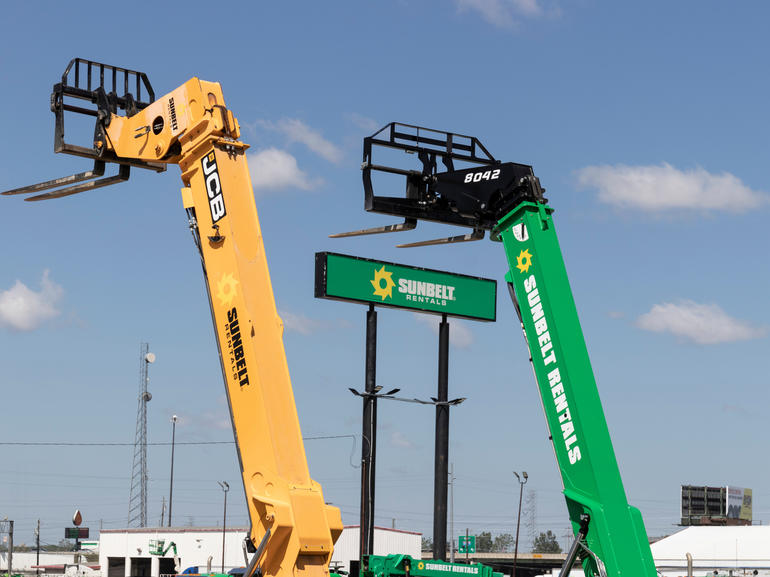The Equipment Rental Industry: Where Net Lease Industrial and Retail Converge

In the evolving landscape of net lease investment, the growth of United Rentals, Sunbelt Rentals, and Herc Rentals marks a pivotal trend in the triple net (NNN) lease sector, highlighting the convergence of industrial utility with retail-like accessibility. These companies are central to the equipment rental industry, and they are redefining traditional NNN product by embodying characteristics of both sectors. With the lines between retail and industrial blurred, this offers investors new pathways to explore value in an otherwise segmented market.
Expansion by these companies mirrors the broader surge of the construction equipment rental market, which is projected to grow at a compound annual growth rate of 6.12% from 2023 to 2030. Driving this growth is increased government infrastructure spending and a shift toward renting equipment due to rising costs of new machinery. Holding about 34% of the U.S. market for equipment rentals, these companies highlight the sector's nearly 60% growth over the past decade.
Retail Sector Volatility and Cap Rate Increases
The single-tenant net lease retail sector faces increasing volatility, as it’s been significantly impacted by a rise in interest rates. This has led to higher cap rates, with first quarter 2024 marking the fifth consecutive quarterly increase. Retail cap rates have now risen to 6.38%, with office and industrial sectors experiencing similar hikes. This uptick reflects the market's adjustment to elevated borrowing costs, compounded by a shortage of 1031 exchange buyers and a growing discord between buyers and sellers, particularly noted by a widening gap in median asking and closing cap rates. The retail sector, notably affected, saw an 11.6% increase in market listings in the fourth quarter alone, exacerbated by challenges within subsectors like drug and dollar stores, where companies including Walgreens and Dollar Tree/Family Dollar faced downgrades and operational hurdles, pushing cap rates even higher.
This environment of rising cap rates amidst interest rate hikes underscores the broader market's complexity and the unique stability offered by companies like United Rentals, Sunbelt, and Herc. While the NNN retail sector grapples with these challenges, the robust growth and resilience of the equipment rental market present a contrasting investment landscape, emphasizing the strategic advantage of incorporating such stable, growth-oriented companies into net lease portfolios, especially in a time when traditional retail faces heightened uncertainty. The anticipation of interest rate cuts in 2024 offers a glimmer of hope for stabilization and a potential uptick in deal-making, though expectations are tempered by the market's cautious outlook for the Federal Reserve's forthcoming decisions.
Stability Breeds Investor Confidence
As traditional brick-and-mortar retail continues to face challenges caused by e-commerce, the business models of construction and equipment rental companies help shield them from the direct impact. While not immune to economic fluctuations, this does offer a level of stability unseen in the volatile retail market and positions these tenants as attractive options for investors seeking to mitigate risk in their portfolios. Additionally, in a marketplace where familiarity breeds confidence, the name recognition of United Rentals, Sunbelt, and Herc gives them a significant edge. These are not obscure industrial entities but well-known brands that investors can easily recognize and can have confidence investing in.
Landlords of United Rentals, Sunbelt, and Herc continue to see insulation from the gradual increase in NNN cap rates that the wider market has seen the past year. The average cap rate for United Rentals and Sunbelt Rentals sold in the last 12 months was 5.46% and 6.85% respectively.
Currently, the average on-market cap rate for United Rentals assets is 6.26%, while the average for Sunbelt Rentals is 5.51%. As a comparison, most industrial outdoor storage (IOS) assets in prime markets are listed between 5.50% and 6.50%.
Investing in properties leased to these tenants comes with the added advantage of locating on infill industrial land. Such locations are rapidly appreciating, offering investors the prospect of significant capital gains. Furthermore, properties occupied by these tenants typically feature low land coverage ratios, encouraging long-term tenancy and positioning landlords favorably for rent appreciation when the market shifts or in-place leases expire.
Recent M&A Activity Leads to Aggressive Growth
United and Sunbelt Rentals continue to be aggressive players in the M&A sphere. United Rentals completed the acquisition of Ahern Rentals in 2022 for $2.0 billion and acquired Yak Access, a leader in the North American matting industry, for $1.1 billion. Sunbelt acquired 50 rental companies for $1.06 billion at fiscal year-end April 2023. Herc Rentals acquired Quality Equipment Rentals and Aerial Work Platforms, Inc. in early 2024. The equipment rental giants are in an acquisition arms race, increasing their existing footprint and augmenting their existing stores through aggressive M&A activity, further enhancing brand awareness.
Redefining Traditional Net Lease
The landscape of NNN investing is undergoing a profound transformation, with United Rentals, Sunbelt, and Herc distancing themselves amongst that change. By blurring the lines between retail and industrial leases, these companies are redefining value in the NNN market. For investors, this represents a unique opportunity to diversify portfolios with stable, recognizable, and appreciating assets, setting a new standard for investment strategy in the process.

